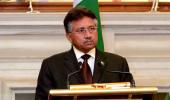The Musharraf episode in the recent history of the subcontinent has convinced many realists in India that the hope of establishing peace with Pakistan is like accepting a dinner invitation from cannibals and expecting to live to tell the tale, notes Colonel Anil A Athale (retd).

General Pervez Musharraf, who passed away on February 5, 2023, was a quintessential Pakistani.
He played a major role in the development of the South Asian security environment, the contours of which are visible in the decades of the 21st century.
Assessment of his role will help us understand the past and help negotiate the future.
Musharraf is well known as the architect of the Kargil incursion by Pakistan in May 1999. It was a tactically brilliant move.
Pakistan successfully hid the concentration of troops in front of Kargil posts and occupied the areas once Indians vacated these for winter, as was the practice all these years.
Indian intelligence failed to detect these moves till it was too late.
It is believed that Musharraf as chief of army staff personally visited the occupied posts at grave personal risk.
Kargil is a typical case where tactical brilliance was combined with strategic failure.
Musharraf and Pakistan failed to anticipate a strong Indian response, especially the use of air power to cut off supplies as well as pulverise the defenses.
The world was alarmed at the open hostilities between the two nuclear powers and came in full support of India.
American pressure and the sheer bravery of Indian infantry in attacking uphill against all odds forced Pakistan to ultimately withdraw from the occupied areas.
Musharraf can also be held responsible for the failure of one genuine peace effort that Atal Bihari Vajpayee and Nawaz Sharif tried post-nuclearisation in 1999.
The reference here is to Vajpayee's Lahore Bus trip initiative.
Musharraf successfully sabotaged peace through his Kargil adventure.
We at INPAD (Initiative for Peace and Disarmament) were supporters of a peace initiative and had suggested a Vajpayee trip and a unilateral initiative.
The logic behind this was that now that both countries have nuclear weapons, an all-out war is out of the question.
Since the war was out of the reckoning, why not live in peace?
Musharraf on the other hand had a very different take on the situation.
He felt that Pakistani nuclear weapons neutralised Indian conventional superiority and if Pakistan could organise a surprise attack and grab some strategic area in Kashmir, India would be forced to accept it a la Siachen (where India occupied some areas in 1987).

Musharraf shrewdly transferred the blame for the Pakistani withdrawal on Nawaz Sharif, overthrew him and usurped power.
He had popular support for this action and most Pakistanis regarded him as a hero.
Musharraf's rule would have been short-lived as the US had begun mounting pressure for a return to civilian rule.
However, the 9/11 terror attack on the US and the American invasion of Afghanistan transformed the situation wherein the US needed Pakistan territory to access landlocked Afghanistan.
Musharraf exploited this opportunity to the hilt and ensured the flow of dollars and weapons to Pakistan.
The Americans were taken in by his show of support in the war on terrorism and pressured India to deal with Musharraf.
I visited Pakistan as a part of a Track II initiative in 2006 when Musharraf was at the height of his popularity in Pakistan.
In the same year, on July 11, 2006, Pakistani-backed terrorists caused multiple bomb blasts in Mumbai that killed 209 people and injured 700 others.
At that point, I publicly disassociated from the so-called peace initiative with Pakistan.
Musharraf's success was that despite this and the even more dastardly 2008 attack in Mumbai (26/11) after he had lost power, Pakistan continued its twin-track approach to India of combining terror attacks and peace talks. Musharraf can well be called the pioneer of this successful Pakistani approach.
Musharraf's success in hoodwinking India is as much an Indian failure as his success.
Successive Indian regimes, including even Mr Narendra Modi, have entertained the idea of peace with Pakistan.
Although to Mr Modi's credit, he has decisively debunked the 'talks continuing while terror attacks continue' policy, and also implemented a new strategy of active retaliation to terror attacks.
Once India got strong political leadership, India began to use the same Kargil logic of using the nuclear shield to carry out retaliation against terror attacks by Pakistan.
By spurning the Lahore initiative, Musharraf has done long term damage to Pakistan's interests and prospects of peace in the subcontinent.
Musharraf or any ruler of Pakistan is conditioned to follow the basic logic of Pakistan that rests on three pillars.
First is the religiously ordained concept of 'Ghazwa e Hind' or conquest of India as written in the Hadith.
The second is a shared memory amongst the masses that Muslims were the rulers before the British and now that the British have gone, Muslims must return to rule India.
The third strongly held belief in Pakistan is that India cannot remain united as it is divided into too many groups/languages/races.
The Musharraf episode in the recent history of the subcontinent has convinced many realists in India that the hope of establishing peace with Pakistan is like accepting a dinner invitation from cannibals and expecting to live to tell the tale.
Colonel Anil A Athale (retd) is a military historian whose earlier columns can be read here.
Feature Presentation: Aslam Hunani/Rediff.com









 © 2025 Rediff.com -
© 2025 Rediff.com -